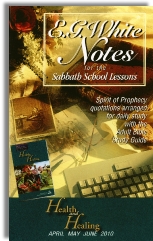|
||||||||||||||
Commentary on "Optimism: Happiness and Healing"
Day 4: Tuesday, June 8, 2010 - Be Joyful Always
Overview
Today’s lesson looks at how we can still have hope and optimism amidst our pain. Pain and trouble are not evidence that we don’t know the Lord, the author says, for we have many Biblical examples of people, including Jesus, who did not rejoice in all situations. We can have joy and optimism in spite of our troubles, and because a loving God has given us promises, our troubles never take Him by surprise. Because of the hope these promises give us, we can have optimism in the worst situations.
Observations
This Lesson’s use of the word optimism is troubling, because it conveys a sense of doubt. Optimism is not a state of mind that causes rejoicing, and that is because optimism lacks confidence. How optimism differs from Biblical hope can be illustrated this way. You might say, “I am optimistic that I will have my job two years from now, though one can’t be certain in this economy.” But you would never say, “I’m optimistic about the sun rising tomorrow morning,” because you are certain it will; it always has. In the first statement, you acknowledge uncertainty about the future. Biblical hope, however, is as confident of God’s promises coming to pass as we are that the sun will rise tomorrow. He is even more dependable than the sun, for it is impossible for Him to fail.
When we stand on mere optimism, we assume God’s promises are contingent on many things that are out of His control. History is therefore driven by human choices where God won’t interfere. Prophecies and promises must then have a lot of disclaimers and fine print attached. However, followers of Christ can see that His Word has been completely fulfilled in His life, death, and resurrection. On Christ the solid Rock we have a secure place to stand. So let us not be merely optimistic about God’s promises; we have reason to be confident and rejoice with all our hearts.
God’s Word commands us to rejoice, without exception, in all things (James 1:2-4; I Thess. 5:16; Jn. 15:11). This joy is real because it comes from the Holy Spirit, not from us. We can rejoice because God’s promises are real, they are certain, and He has sworn by the highest authority, Himself (Heb. 6:13-19). So it is important that we know what the bedrock of our joy is. In I Thessalonians 5, we learn three primary elements in the life of faith; rejoicing, praying, and giving thanks. The lesson asks how these admonitions are related.
Rejoicing: When we rejoice, we are leaning hard on the knowledge that Jesus has born our griefs and carried our sorrows. His beatings bring us healing. His punishment brings us peace (Is. 53:5). The immensity of His sacrifice tells us the size that our joy can be. And as Spurgeon said, the fact that we have been commanded to rejoice is itself cause for rejoicing, because the fulfillment of that command is already bought by Christ’s blood. Yes, joy is a duty, but it is not a natural disposition; it is a deep, supernatural experience, a fruit of the Spirit (Gal. 5:22). Whatever Jesus commands of us, He gives us.
Praying Continuously: Rejoicing and prayer belong together. We can pray anytime, anywhere, in any language, including the language of silence. We are encouraged to complain loudly and moan to Him (Ps. 55:17), when He seems far away, and when we feel like the scum and garbage of the earth (Lam. 3:45). Then, in a brief blink of a prayer we can cast all our cares on Him (I Peter 5:7). Prayer is an attitude of dependence and trusting that we can keep with us every moment, even while sleeping, or weeping. In prayer we enter boldly to the throne of grace and find mercy and help in time of need (Heb. 4:16). In the throne room, we can dispense with our flowery words and clichés and pour out ourselves to Him. And how far do our prayers travel to reach that throne? Aren’t there fourteen hundred light years between us and Orion? No need to look there, for His throne room is near us, even in our hearts.
Giving Thanks: Gratitude is the foundation of happiness. For believers, gratitude has an object of trust: our Father who has given us all things in Christ. The unbeliever has trouble feeling grateful because he believes his life is either controlled by blind luck, the indifferent forces of fate, or his own power. These are all sinking sand.
Giving thanks in all things is a radical command. When we comprehend that we are to give thanks in all things, with heartfelt gratitude, we might feel outraged. It is hard enough to thank our neighbor for the simplest kindness. But to give thanks to God for everything, including the worst things done to us? Really, it would seem easier to give a thank offering under the old Law—by building an altar, catching a sheep, and sacrificing it with our bare hands. But these New Covenant commands are just not natural. Even so, we have been commanded to show real gratitude, all the time, from the heart.
Romans 8:28 gives us a reason why Christians can feel this strange gratitude:
“And we know that for those who love God all things work together for good, for those who are called according to his purpose.”
All things work together. This tells us there is a greater purpose, above nature’s forces, that was spoken into existence from old, and that purpose is working now (Isaiah 46:8-10). It also tells us that even Satan was made to serve God’s ultimate purposes, from the beginning:
“Things in heaven and on earth…thrones or powers or rulers or authorities; all things were created by Him and for Him.” Colossians 1:16
Because history belongs to Him, and we inherit all things through Christ, everything in history will ultimately serve our benefit. One of the ways that God brings about His purposes is to give us power to rejoice, pray, and thank Him always. There’s no room for lady luck or mindless forces in that picture, which is yet another blessing to thank Him for.
Conclusions
- Using the word “optimism” conveys a sense of doubt, so it cannot describe the biblical hope given to the Christ-follower.
- God has demonstrated His control of history in the life, death, and resurrection of Jesus Christ, so we can be confident of all His promises.
- From that confidence, we can obey God’s commands to rejoice always, pray continuously, and be thankful in all things.
- Romans 8:28 gives us strong encouragement, knowing that our God rules history, and He will ensure that all things, even evil things, will ultimately benefit His people.
Copyright 2010 BibleStudiesForAdventists.com. All rights reserved. Revised June 8, 2010. This website is published by Life Assurance Ministries, Glendale, Arizona, USA, the publisher of Proclamation! Magazine. Contact email: BibleStudiesForAdventists@gmail.com.
The Sabbath School Bible Study Guide and the corresponding E.G. White Notes are published by Pacific Press Publishing Association, which is owned and operated by the Seventh-day Adventist church. The current quarter's editions are pictured above.
Official Adventist Resources
Standard Edition Study Guide Week 11
Teacher's Edition Study Guide Week 11
Easy Reading Edition Study Guide Wk 11
Search the Complete Published Ellen G. White Writings


